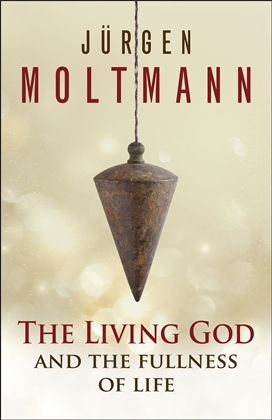Jurgen Moltmann: The Living God and the Fullness of Life
 Jürgen Moltmann, The Living God and the Fullness of Life (Louisville, KY: Westminster John Knox Press, 2015), 232 pages.
Jürgen Moltmann, The Living God and the Fullness of Life (Louisville, KY: Westminster John Knox Press, 2015), 232 pages.
Moltmann characterizes his monograph, The Living God, as a “contribution to a theology of life” and a continuation of his works The Spirit of Life (1992) and The Source of Life (1997). The book is divided into two parts. The first part explores biblical understandings of “the living God.” Here Moltmann seeks to liberate these biblical ideas from the constraints of Greek and Enlightenment philosophy. Part two considers how human life is impacted by this living God. Ultimately, Moltmann attempts to reach both professional theologians and amateur theologians, including those who may be new to thinking theologically.
In the introduction, Moltmann argues that modern humans, by succumbing to humanistic and naturalistic ways of thinking, have isolated themselves from realizing the fullness of life that is given by God. He looks at the philosophical underpinnings of these worldviews, particularly the thought of Ludwig Feuerbach, and comes to the conclusion that courage to be one’s self has a greater chance of being discovered in the religious life, rather than in the life of the atheist. In chapter one, Moltmann draws from scripture, especially Psalms, to illuminate that God provides vitality to creation from his overflowing abundance of love. Next, Moltmann challenges Hellenistic views of an impassible God that he proposes were adopted by Christianity. He argues that God must change, otherwise God is dead. The Creator is moved by the suffering of his people, and nowhere is God’s suffering understood more than in the crucifixion. In chapter three, Moltmann addresses the unity of God in consideration of the trinity. For him, trinitarian theology must begin with the history of Jesus. God’s actions in history reveal his nature to us.
In part two, Moltmann suggests that we become a person within community, and this community includes the earth. For him, eternal life is not the hope of going to heaven, but communion with God through the cosmic Christ. Thus annihilation of the earth is “a vision hostile to life and a destructive spirituality” (84). Chapter five discusses joy, which comes from the Spirit. Moltmann writes that God shares in this joy with us. This is not just a fleeting happiness, but it is a deep joy that pervades our entire being. He concludes that we experience suffering because we long for godly joy. In chapter six Moltmann focuses upon God as a liberator. Unlike the modern worldview, where freedom is seen an autonomy, he proposes that true liberation comes through fellowship with God and the human community. Accordingly, we find new potentials in God.
Moltmann continues his text by asserting that God encounters humans in friendship. It is a relationship of reciprocity whereby God listens to and sincerely cares for us. Chapter eight addresses God’s love by focusing upon the perichoretic nature of the trinity that spills into the lives of human. God is capable of love because God suffers alongside us. In chapter nine Moltmann advocates that God is found within us. The Spirit penetrates us and the world, so the world should be recognized as a sacrament. Yet, by withdrawing to pray, we find God in a unique way. Next, Moltmann addresses eschatology. He emphasizes that fullness of life points to joy beyond our present reality. At the same time, though, eternal life includes both suffering and rejoicing. In the final chapter Moltmann analyzes worship, including the eucharist, singing, and praying. He suggests that these activities move God and bring us into relationship with him. Worship also brings us into solidarity with creation, therefore we should understand that all of life is a sacramental festival.
In my opinion, Moltmann successfully accomplishes his goal of writing for both the theologian and the non-theologian. Those who are acquainted with Moltmann’s theology will find many familiar themes in this text that supplement his earlier writings. Many Pentecostals are attracted to Moltmann’s focus upon the Spirit, and this book continues to offer fresh pneumatological insights. Although nothing in this text is likely to surprise those who appreciate Moltmann’s theology, he offers new images and practical ways of thinking about God. At the same time, this text makes Moltmann accessible to amateur theologians because of its focus and readability. One critique that I offer is that the text is lacking a strong theme that runs throughout. Leading up to the final chapter, he does not construct a single, overarching argument. Moltmann touches on similar topics in various chapters, but none fully rely upon the previous. Consequently, the text lacked the type of focus that I am accustomed to expect from Moltmann. On the other hand, this feature also provides an advantage to reaching the non-theologian. Each chapter can stand on its own, so one could approach the text by engaging smaller portions at a time. This book may be an apt introduction to Moltmann’s theology.
Reviewed by David Bradnick
Publisher’s page: http://www.wjkbooks.com/Products/0664261612/the-living-god-and-the-fullness-of-life.aspx
Category: In Depth, Winter 2017


